Plastic bags use is slowly declining around the world, and cotton tote bags have become a symbol of that change. Lightweight yet durable, these eco friendly tote bags have turned into everyday essentials for people who value practicality and an eco-friendly lifestyle.
But not all cotton is created the same way. Organic cotton and organic tote bags are reshaping the way we look at packaging and fashion, proving that what we carry can also be a choice that benefits the planet.
In this guide, we’ll take a closer look at how these tote bags are made, why the materials and manufacturing process matter, and what to consider when choosing a sustainable tote that aligns with your values.
What Makes a Tote Bag Sustainable?
A sustainable tote bag is more than just an alternative to plastic. It is designed with the planet in mind from start to finish, starting with the right materials such as organic cotton and canvas.
These natural fabrics are renewable and often biodegradable, breaking down at the end of their life instead of adding to waste.
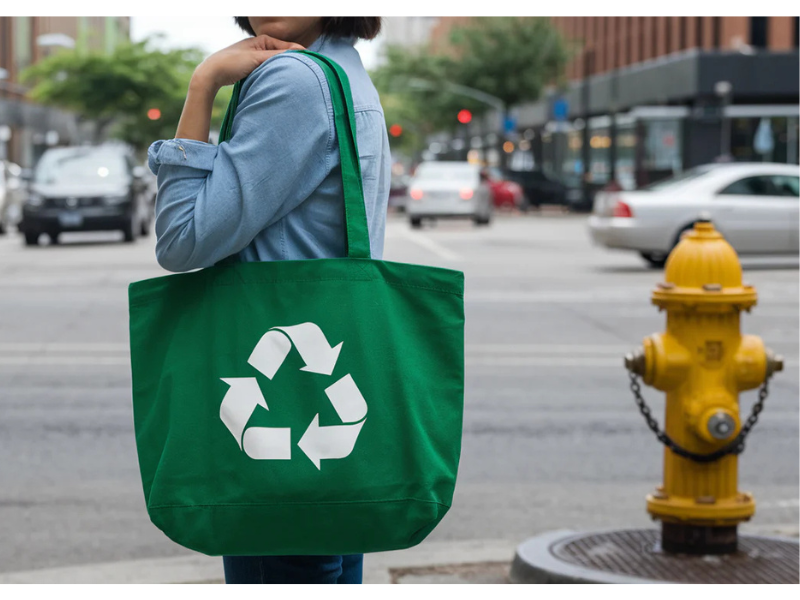
The manufacturing process is equally important. Responsible brands use low‑impact dyes, ethical labor, and methods that consume less water and fewer chemicals. Even careful stitching and safe techniques like heat transfer printing help reduce the footprint of a cotton bag.
Finally, sustainable tote bags are built for durability. They are designed to be reusable for years, and when their time is up, they can be recycled or composted. This is why not all cotton bags are automatically sustainable; it depends on how the cotton is sourced and produced.
What Is Organic Cotton?
Organic cotton is different from regular cotton because it is grown naturally. Farmers do not use synthetic pesticides or chemical fertilizers. This keeps the crops and the land free from harmful chemicals.
Growing organic cotton also saves water. Compared to normal cotton, it needs much less water, which makes it better for the environment, especially for activities like grocery shopping.
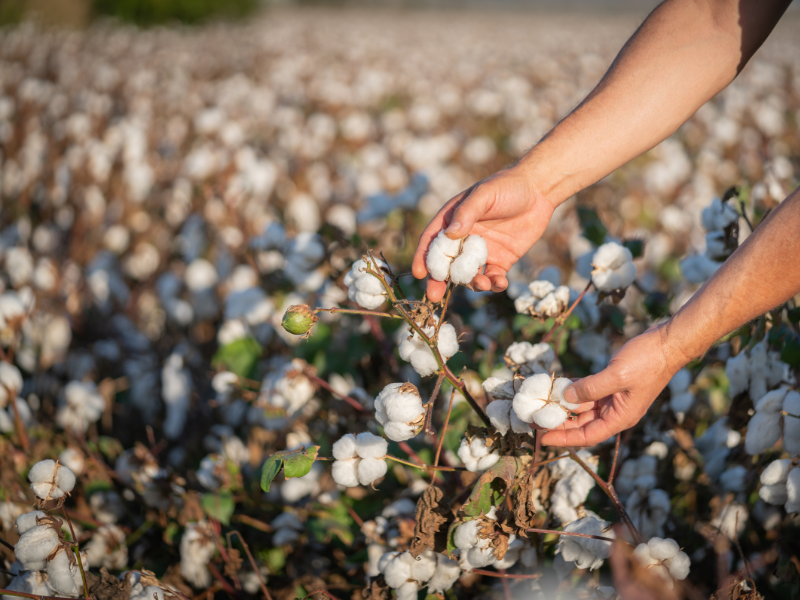
To make sure the cotton is truly organic, there are strict standards. You may see certifications like GOTS (Global Organic Textile Standard) or OEKO‑TEX on bags and fabrics made with organic cotton.
Organic farming also improves soil health. It protects the farmers and workers from chemical exposure and supports safer, fair working conditions.
When you choose sustainable tote bags made with organic cotton, you are supporting a healthier planet and contributing to reducing plastic pollution.
Benefits of Organic Cotton Tote Bags
Switching to organic cotton tote bags is a small step with a big impact. These bags combine style, strength, and care for the environment.
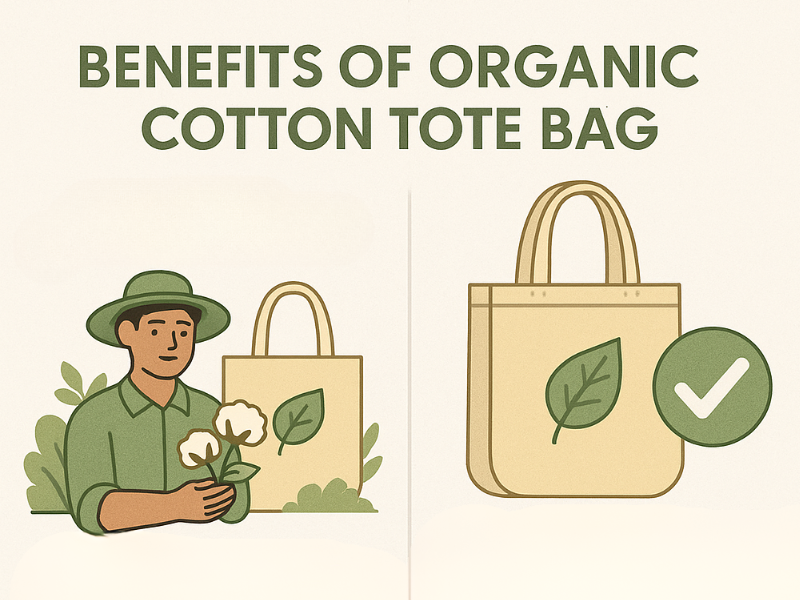
Good for People and Nature
Choosing organic cotton tote bags helps protect farmers and the environment. These bags are made from recycled materials like cotton grown without harmful chemicals, which keeps the soil, water, and nearby ecosystems healthier.
Strong and Durable
Organic cotton has high‑quality fibers. This makes the bag strong and long‑lasting. A durable, sustainable tote like canvas bags can be used many times, which reduces the need for single-use plastic bags.
Biodegradable
Unlike plastic, organic cotton bags naturally break down at the end of their life. They leave behind no harmful waste, making them a safe choice for an eco-friendly lifestyle.
Perfect for Printing
The smooth surface of organic cotton works well with water‑based inks and heat transfer printing. This allows brands to create stylish designs without damaging the fabric or the planet.
A Positive Brand Message
Carrying or selling sustainable tote bags shows care for the environment. It aligns perfectly with customers who value sustainable choices and responsible fashion.
Ready to switch to sustainable tote bags?
Explore our Organic Cotton Tote Collection at iTendee.com and choose a bag that matches your style and values.
The Manufacturing Process of Cotton Bags
Behind every sustainable tote bag, there is a structured process that combines responsible sourcing with skilled craftsmanship. Understanding how these bags are made gives insight into why some stand out for their quality and environmental impact.
Harvesting and Preparing the Fiber
The journey begins with organic cotton, cultivated without synthetic pesticides or fertilizers. Once harvested, the cotton is cleaned and prepared, preserving the purity of the fiber while keeping the soil and surrounding ecosystems safe from chemical exposure.
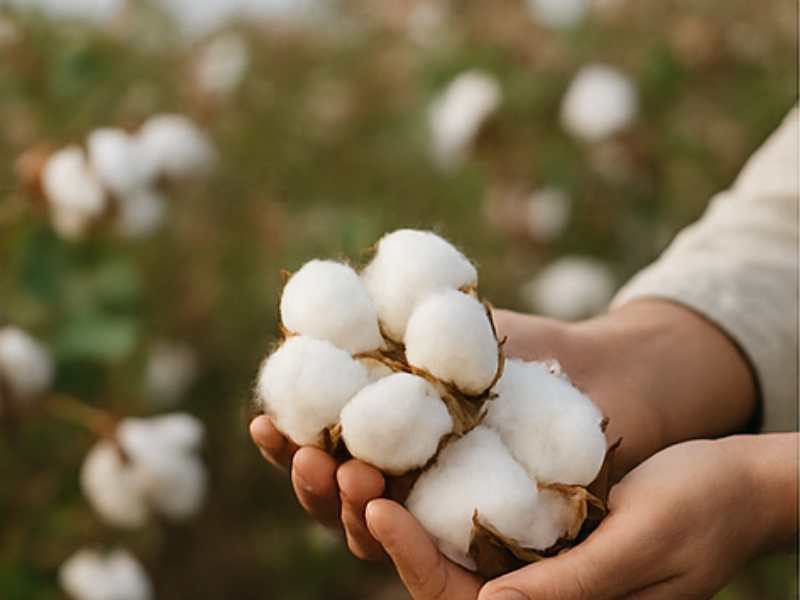
Spinning and Weaving
Clean cotton fibers are spun into yarn and then woven into sturdy fabrics, often canvas, known for its natural strength. This stage, involving the selection of raw materials, determines the texture, weight, and durability of the final bag.
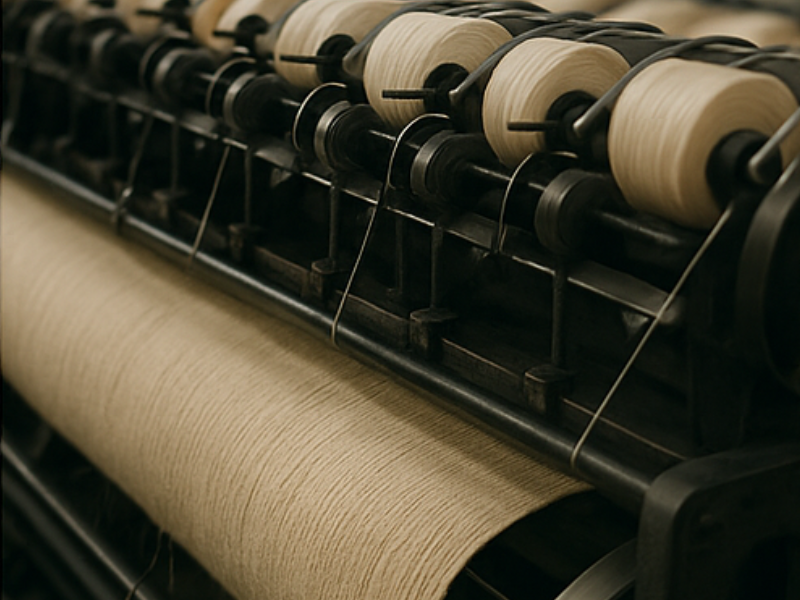
Cutting and Stitching
In ethical facilities, panels of fabric are precisely cut and shaped before being assembled. Skilled artisans focus on reinforced stitching, as strong seams are essential for a cotton bag that will last for years.
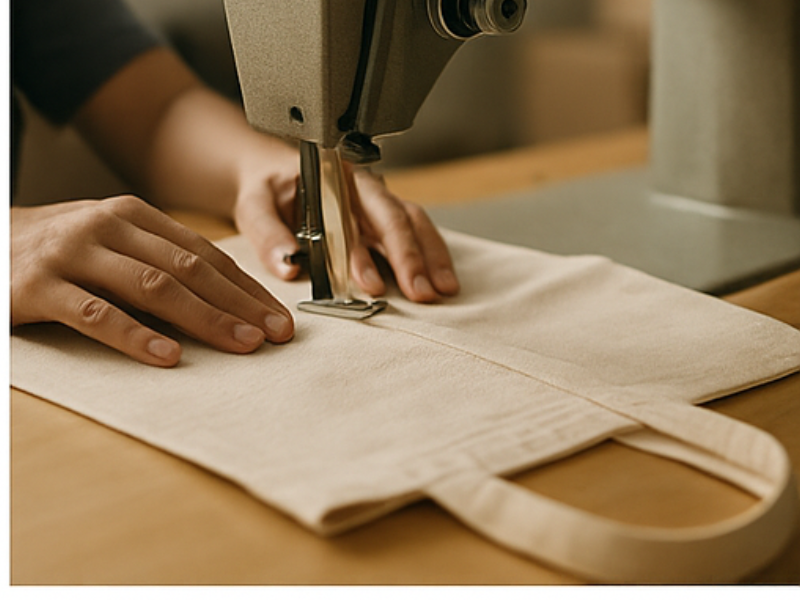
Printing and Surface Design
When designs or logos are required, sustainable factories use eco‑friendly techniques such as water‑based inks, screen printing, or heat transfer. These methods reduce chemical use, maintain fabric breathability, and create long‑lasting prints without harming the materials.

Finishing and Quality Control
Each tote is inspected for consistency, ensuring handles, seams, and surface finishes meet high standards. This careful attention to detail defines the durability and professional appearance of the final product.
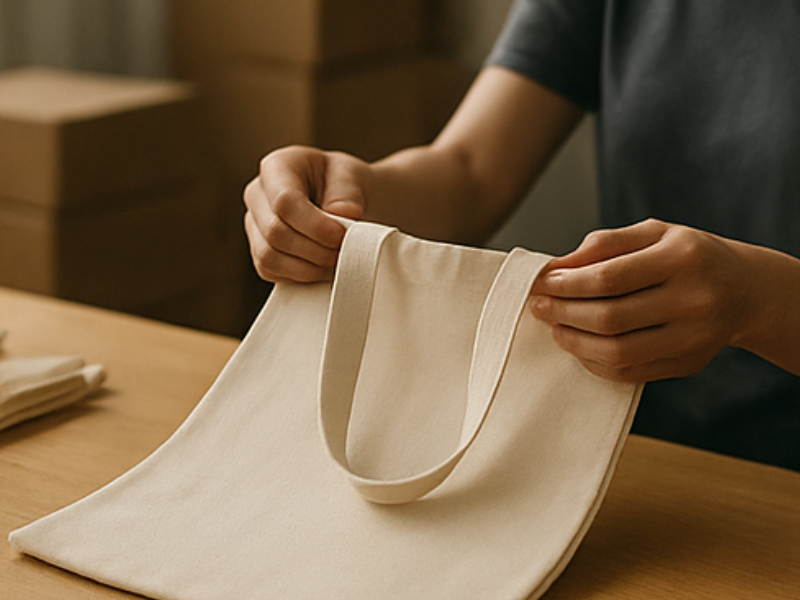
Packaging and Distribution
Responsible brands avoid single‑use plastic packaging, opting for recycled or compostable materials. Many ethical manufacturers also invest in renewable energy and closed‑loop water systems, reducing waste throughout the manufacturing process.

This structured approach results in sustainable tote bags that are strong, reliable, and made with respect for both people and the environment.
Every step of our process is designed for quality and sustainability.
Get in touch with iTendee today to source eco-conscious cotton bags made with care from start to finish.
How to Choose Truly Sustainable Tote Bags
Not every cotton bag on the market meets the standards of a truly sustainable tote. To ensure your choice supports both the environment and ethical production, it helps to look beyond the surface.
Certifications That Matter
Independent certifications such as GOTS, OEKO‑TEX, and Fair Trade are strong indicators that a bag has been produced responsibly. These standards verify that the organic cotton is grown without harmful chemicals and that the manufacturing process follows strict social and environmental guidelines.
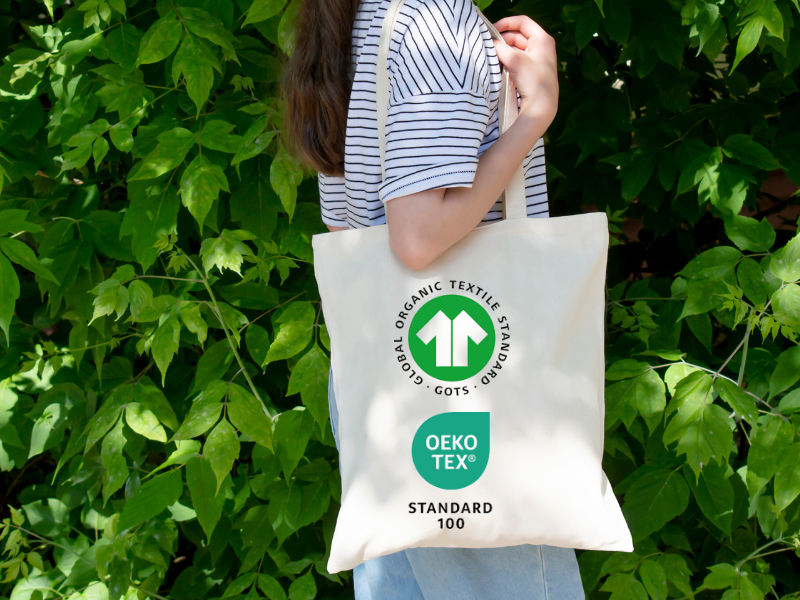
Know the Environmental Impact
Many forward‑thinking brands share data about their carbon footprint, water use, and energy sources. Choosing suppliers who prioritize renewable energy and low-impact production reduces the hidden environmental costs of your tote bags.
Fabrics and Dyes
For a lower impact, look for cotton bags that are unbleached, undyed, or printed with low-impact dyes. This reduces chemical runoff and makes the materials safer to recycle or compost at the end of their life. Printing methods such as heat transfer with water-based inks also help maintain fabric integrity.
Transparency and Local Production
Brands with transparent, traceable supply chains allow you to see where and how your bag was made. When possible, choosing locally made, sustainable tote bags also cuts transport emissions and supports regional artisans.
Bulk Ordering for Businesses
If you are sourcing bags for retail or events, ordering in bulk reduces transport-related emissions. Fewer shipments mean a smaller environmental footprint for the same number of products.
By considering these aspects, you ensure that your eco-friendly choice is backed by real impact rather than marketing claims.
Looking for reliable, GOTS-certified sustainable tote bags for your brand or event?
Request a Custom Quote from iTendee and bring your eco‑friendly vision to life.
FAQs
Are all cotton tote bags eco-friendly?
No. While cotton is a natural fiber, the sustainability of a cotton bag depends on how the cotton is grown and the manufacturing process. Organic and ethically made tote bags are far better for the planet than conventional ones.
What’s the difference between conventional and organic cotton?
Conventional cotton uses pesticides and chemicals, which affect soil and water systems. Organic cotton, on the other hand, is grown naturally without synthetic inputs and with better water management.
How long do organic cotton totes last?
With strong stitching and quality materials, an organic cotton sustainable tote can last for several years, replacing hundreds of disposable plastic bags.
Can organic cotton bags be composted?
Yes. Since organic cotton is a natural, biodegradable fiber, a worn-out bag without synthetic printing or linings can be composted or recycled at the end of its life.
What does GOTS certification mean?
The Global Organic Textile Standard (GOTS) ensures that the entire manufacturing process, from farming to finishing, meets strict environmental and ethical criteria. A GOTS-certified bag guarantees both organic fibers and responsible production.
Conclusion
Organic cotton tote bags are more than a passing fashion trend. They represent a practical and ethical alternative to single‑use plastic, helping businesses and individuals reduce waste while making a positive environmental impact.
From eco‑conscious retail packaging to large‑scale events, choosing sustainable tote bags supports better farming practices, ethical labor, and a cleaner planet. Every bag made from organic cotton becomes a small but powerful step toward a more responsible future.
Looking for wholesale or custom organic cotton totes? Choose certified sustainable options at iTendee that align with your values and create a lasting impression.





